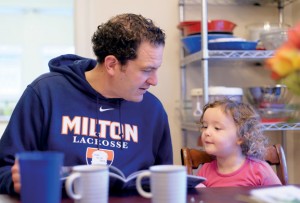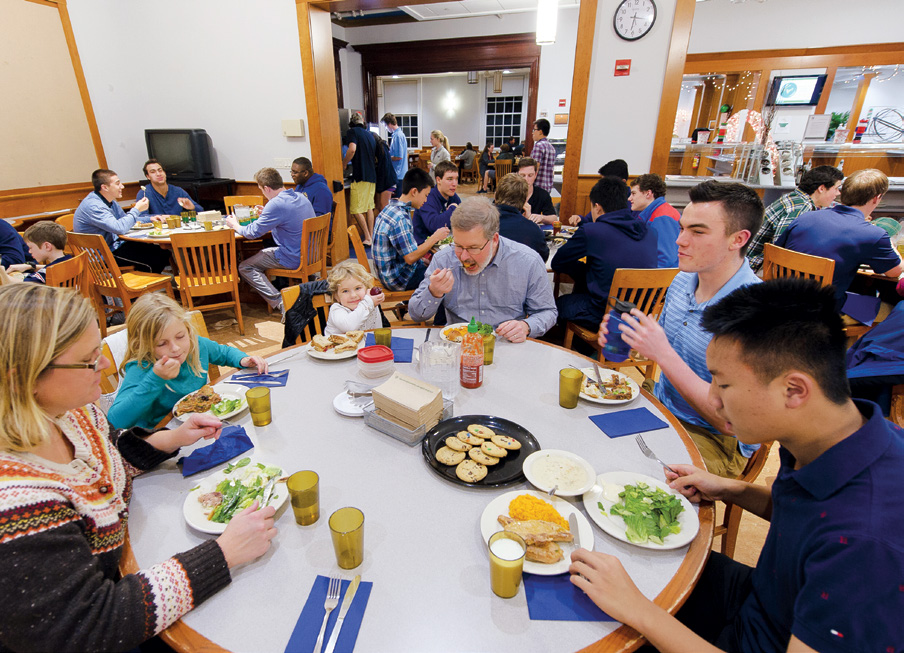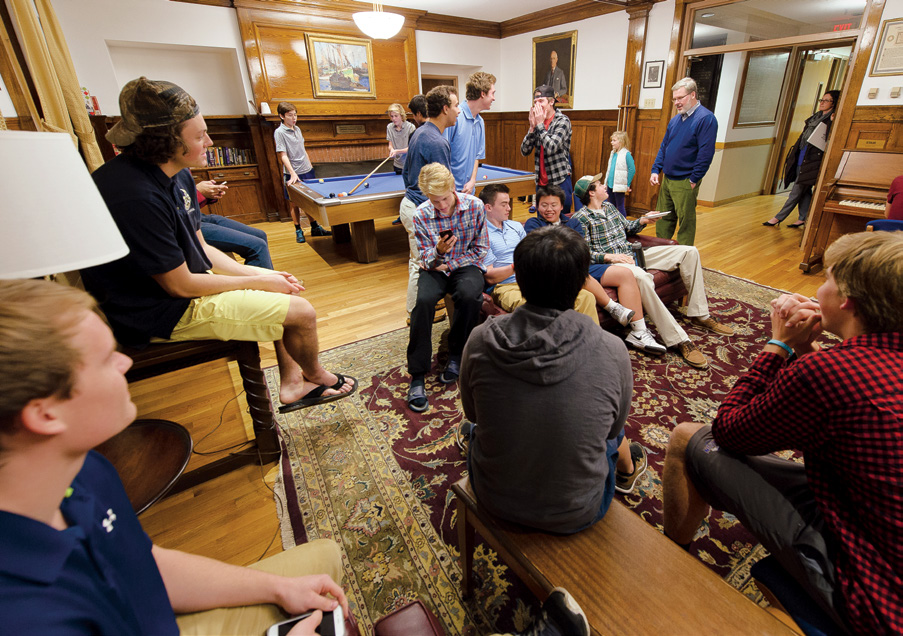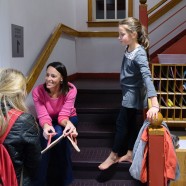
“There’s something remarkable about getting to know a teenage boy over four years,” says Joshua Emmott, Wolcott House head, “to see him as a full person so completely that when life’s key questions come up, it’s natural for him to knock on my door and say ‘I just don’t see how it all connects.’” This year is Joshua’s twelfth — in the history department, and in Wolcott House. “I started on the fourth floor and have lived on every floor,” he says. “This is my third year as house head.”
Fortunately, some adults seek out a career that allows them to build deep and lasting relationships with teenagers. Joshua and his wife, Anne Austin, remember dorm staff at their respective boarding schools as some of their most important role models. That partially explains why they sought out a boarding school in Boston for Joshua’s teaching career. Their two little girls were born during the family’s Wolcott years; Madeline (8) and Ingrid (4) consider the Wolcott boys — “the big boys” as they call them — as close friends. Rachel Klein-Ash (Robbins House) says that she discovered “this thing called boarding school” only as she finished grad school. “Oh,” she thought, “so that’s the way to get and stay in touch with kids, to really develop relationships.” That was in 1995. She arrived at Milton in 1996, met and married her husband James, and now their family, including children Elly (8) and Bennett (6), is at the center of life in Robbins House. When he was a novice in Robbins House, Miles Bailey promised his wife, Susie, that she would be amazed at what these Class IV girls would be like “four years from now.” Susie was. Now Miles heads Norris House. He, Susie and their daughter, Kate (3), “think it’s great to see kids we know so well in every venue that’s meaningful to them: a play, an assembly, a football game, a presentation, a house meeting.”
Joshua Emmott teaches history (U.S. History; United States in the Modern World II; History of the Middle East; and History of Globalization and Islam). Rachel Klein-Ash is a college 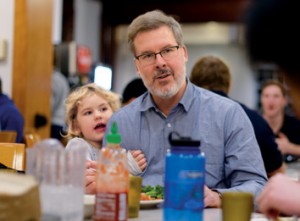 counselor. Miles Bailey directs student financial aid. They manage challenging school careers. They are spouses and parents in busy families. Beyond that, the boys and girls in Wolcott, Robbins and Norris, respectively, count on them — every day and every night. Each of them helps young people admirably manage their most formative years. No single playbook gives them the right strategies to guarantee that outcome, however.
counselor. Miles Bailey directs student financial aid. They manage challenging school careers. They are spouses and parents in busy families. Beyond that, the boys and girls in Wolcott, Robbins and Norris, respectively, count on them — every day and every night. Each of them helps young people admirably manage their most formative years. No single playbook gives them the right strategies to guarantee that outcome, however.
Safe Scaffolding
To start with, students can rely on certain structural supports in Milton’s residential life — Milton’s advising system, for instance. Both Joshua and Miles routinely “advise” new students. Rachel has also advised girls new to Milton during her many years in Robbins House. Advisors keep their antennae on what’s happening in their advisees’ lives; they stay connected — to students and their parents as well — guiding when and how it’s appropriate. They help new kids understand Milton’s culture — that takes about two weeks to take hold, according to Joshua. Thriving at Milton, most students say, depends on being open to new and unfamiliar personalities and backgrounds, being amazed at what your housemates bring to the table. Students learn quickly, from everyone in the house, that they’re no longer simply individuals with certain needs and patterns; they’re also members of a 40+-person community. Now, what each of them does and says matters, more than it might have in the past. From Rachel’s perspective, the fact that Milton students live in the same dorm for all their Milton years is pivotal. It intensifies the rewards students feel, over time, and it surrounds younger students with a caring network of older girls and boys who willingly help them. Norris, Wolcott and Robbins houses have set up “family” groups within the dorm. A family includes boys, or girls, from all four classes (the family head is a Class I proctor); in several dorms, family members rotate during the year. Family groups eat dinner together once each week, and logistics for dorm gatherings and outings are organized by family. Each house tweaks its beloved annual traditions to add today’s flair. Elected dorm leaders are tone setters in the houses and spokespeople for the legacy values.
If a durable structure sets a framework, sheer time and physical presence are probably the most powerful active ingredients. “Every adult living in the dorm has a different style,” Miles says. “My style comes down to ‘time spent’ — that is, the will and the patience to just be there, to let kids self-identify over time. Am I the adult they seek out? If not, I know whether they’ve found the right footing with another trusted adult in the house.”
“It’s the moments,” Joshua explains, “when they’re not in class, not in a formal meeting, it’s after check-in at night, or at 3 a.m. when they’re feeling sick and they need your help. You get into discussions with kids and get to know them like you can’t in any other way.” And you never really know “who will be moved,” Joshua says. It happens in the dorm over four years, organically. “Every night of the week,” Joshua says, “I’m doing something with teenage guys — it’s thematic: cleaning rooms, study halls, dorm meetings, or just hanging out.”
“To work this way,” Miles says, “you acknowledge that the role is going to take time you don’t think you have or perhaps want to give, but in the end, requests from students (like, ‘Mr. Bailey, do you have a lacrosse ball?’ at 11 p.m.) are not intrusive — they’re usually reasonable, understandable — and regardless, you’re helping a kid you really care about.” Miles uses the moments before dinner each night to say hello and check in on the Norris House boys. Carefully observing kids, in the common room, each day as they head in for dinner, he believes, “makes it easy to see how they’re doing and what they might need.”
“This commitment takes prodigious energy,” Rachel says. “It’s late-night energy, after a full day, caring for a husband and children, with work from the office to do — and although I get older each year, the girls living in the dorm don’t, and their energy level doesn’t change. You can get into some heavy, emotional ground over the year, but mostly it’s about how much we get to laugh, to have fun with each other.”
Teenagers need consistency, dorm faculty know: consistent personalities (“The ‘me’ on duty needs to be the same authentic ‘me’ every time,” says Miles), consistent expectations, consistent constraints, and consistent openness. “They don’t need to know about your own stressors or competing responsibilities,” Rachel says. “They’re the priority.” For house heads like Miles and Joshua, helping their own teams of adults living in the dorm deliver this level of consistency to kids is a key leadership responsibility.
Joshua, Miles and Rachel all tell stories about how thrilled students are, how surprised sometimes, and how grateful they are, to be accepted from the as exactly who they are. “That’s so important to them,” Miles says, “being known and respected as individuals. That’s the Milton ethic, and it’s a source of comfort and pride for kids navigating some challenging years.”
Behind the Scenes
House heads manage the logistics of a house so that faculty who live there can be resources for kids, Rachel notes. John and Ricky Banderob, house heads in Robbins and part of dorm life since 1992, make it possible for the Robbins faculty to be the best they can be for the girls. “The culture among the adults is supportive and flexible, and as John always advises us,” Rachel says, “‘never worry alone.’” It’s easy to “hoard responsibility” as a house head, Miles points out, when it feels easier and quicker to do things yourself than to involve others, but resisting that tendency is important. House heads meet weekly with the dean, the assistant dean of students, the director of counseling, and members of the diversity office. Those meetings are focused on caring for individual students, and on setting the tenor of Milton residential life. Helping teenagers acquire a sense of responsibility beyond themselves is an abiding project, as is making sure students have strong experiences all across campus, in houses that have just enough autonomy to distinguish themselves in the ways students love and remember.
Does It Take a Village?
The spouses and children of dorm faculty have to be good at sharing their own parent. They make sacrifices, “but my children wouldn’t see it that way,” Rachel says, quoting her 8-year-old daughter Elly’s probe, “Mom, we’re never going to move out of the dorm, right?” Rachel’s husband James, a school counselor at Needham High School, is happy to be “just James” in Robbins House (preferably with his guitar) rather than Mr. Ash. Susie, Miles’s wife, is a structural engineer. Anne, Joshua’s wife, is an international public health consultant, traveling at certain intervals to Africa and India. “My girls know the names of the 40 boys who live in Wolcott along with the 40 girls who live next door in Robbins,” Joshua says. Those boys and girls are involved with the little girls’ lives — they play with them, and babysit, read to them, listen and chat. The girls can almost always find children they know right outside on the quad: seven faculty children between three- and eight-years old live in Wolcott alone. “The looming end of summer is bittersweet for me, but the girls get very antsy come mid-August — excited for ‘the big boys’ to arrive,” says Joshua. “The guys are just as excited to see them. After her second year in French immersion at Cunningham School in Milton (Grade 2), Madeline offered Eliot Miailhe (Class IV), from France, a big, warm welcome back in perfect French. She’d prepared! He was thrilled.”
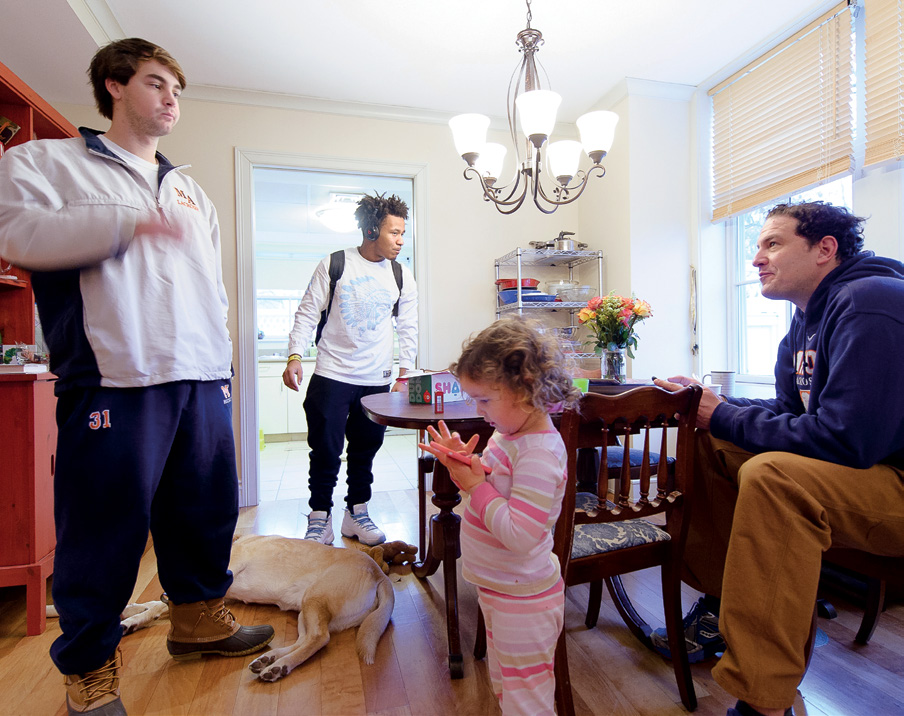 For dorm families, setting boundaries is always a work in progress — “that is, time boundaries more than space,” Miles says. Faculty want to be accessible, and yet count on some time of their own. The duty schedule is “quite reasonable,” Rachel says, “because Milton wants to make sure that you are not burned out, and that you do have energy to give.” For a house head, however, who is often the default resource, “It’s really hard to be ‘unavailable’ when you are physically on campus, on duty or not,” says Miles.
For dorm families, setting boundaries is always a work in progress — “that is, time boundaries more than space,” Miles says. Faculty want to be accessible, and yet count on some time of their own. The duty schedule is “quite reasonable,” Rachel says, “because Milton wants to make sure that you are not burned out, and that you do have energy to give.” For a house head, however, who is often the default resource, “It’s really hard to be ‘unavailable’ when you are physically on campus, on duty or not,” says Miles.
Dorm faculty work to bring kids and adults physically together often enough to feel the sense of their community. The lure of the digital world can isolate people, and that makes using our common rooms together, in fun ways, even more important. “That’s perhaps how Wolcott has developed some pretty excellent pool players,” Joshua laughs. “Can I borrow an egg, and a pan, and by the way, do you want to cook with us?” is a frequent refrain. Diversity among the dorm staff has expanded, and that helps kids develop a heightened cultural awareness rooted in the affection students feel for the adults they know so well. Milton, like many schools, has deepened the health and counseling staff, and these professionals are involved with the students, with their learning
about living well.
Faculty who commit to living with students reap rich rewards. Watching individuals grow (at close range), witnessing the ground they cover and the maturity that takes shape, is tremendously fulfilling and continuously surprising. “Being there for them through all the ups and downs, you end up with a connection that is so valuable,” Rachel says. “I just went to one advisee’s wedding last fall, and I have another ahead this spring.”
“When you see what was anger and resistance in a young teen become trust and a long-lasting sense of connection to these people, this place, and this time in their lives, that’s amazing,” Miles says. Residential faculty often get to see exactly what they want to see at graduation: seniors who are confident in their own skin; make good decisions, with awareness and responsibility; and know how to advocate for themselves as they keep on learning. “The girls are really grateful for us as a house staff,” Rachel says. “It’s the girls, and my colleagues in this house, that have kept me here for so many years.”
by Cathleen Everett




